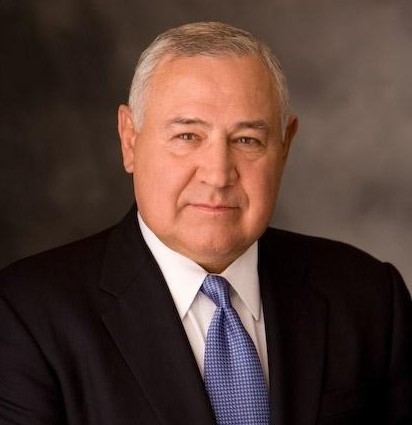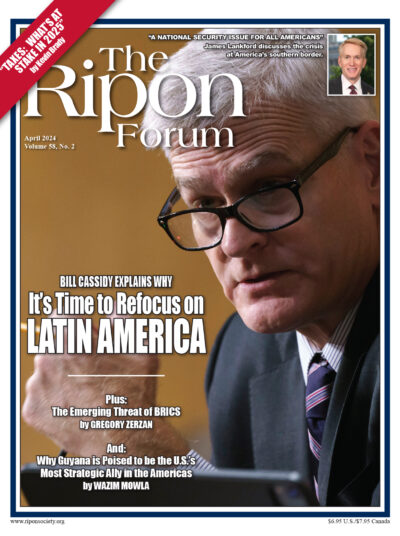
Last year marked the 20th anniversary of the President’s Emergency Plan for AIDS Relief (PEPFAR), a milestone in global health initiated by President George W. Bush. This landmark legislation has saved over 25 million lives and prevented millions from contracting the virus, including 5.5 million babies.
PEPFAR, according to the Bipartisan Policy Center (BPC), also has supported life-saving HIV treatment for more than 20 million people, HIV testing for 71 million people, and other services for millions more. However, as we reflect on these achievements and applaud the recent yearlong extension of the program, we must ensure saving lives isn’t derailed by partisan politics.
I have spent countless hours working on the ground in PEPFAR-funded countries and witnessing its impact in saving lives up close. In my role, I oversaw all U.S. military forces in 91 countries in Europe, Africa, Russia, Asia, and the Middle East, and in most of the Atlantic Ocean. I’ve spent my lifetime keeping America safe, and PEPFAR happily marries the national security interests of the United States with our humanitarian interests. By providing boots on the ground and key support to partner countries around the world, the United States forges both health and diplomatic ties. These connections not only allow us to help address other threats, such as Ebola and Covid, but also provide a positive alternative to China’s growing influence in Africa.
I’ve spent my lifetime keeping America safe, and PEPFAR happily marries the national security interests of the United States with our humanitarian interests.
As I’ve observed, and as the BPC has reported, PEPFAR’s benefits extend far and wide. Countries with more PEPFAR-provided resources have better health outcomes, healthier countries tend to be stronger economically, and PEPFAR has improved views around the world on American global leadership.
PEPFAR was enacted with near unanimous support in 2003. When President Bush proposed it, groups across the political spectrum fought for its enactment – grassroots organizations that provide health care to those in need around the world; religious groups that recognize the need to expand lifesaving care; pharmaceutical companies that provide access to HIV drugs; advocacy groups that support those living with or at risk for HIV/AIDS; and military leaders who recognize that HIV/AIDS reduces the readiness of partner governments. Up until 2023, the program received three, five-year extensions under several presidents and Congresses of both parties, giving the program the needed stability and resources needed to sustain and expand its efforts on a global scale.
Unfortunately, the overwhelming bipartisan support PEPFAR has received in the past has led to only a temporary one-year extension passed by the House in March, thanks in part to allegations that the program is funding abortion around the world. This assertion is false. In fact, PEPFAR continues to follow the law of the land—known as the Hyde Amendment—that ensures our foreign assistance funds cannot be used to pay for the performance of abortion as either a method of family planning or to motivate or coerce any person to practice abortions. I stand with U.S. Global AIDS Coordinator Amb. John Nkengasong who recently stated, “PEPFAR has never, and will not ever use that platform in supporting abortion.”
As President Bush has repeatedly stated about PEPFAR: “Seldom has history offered a greater opportunity to do so much for so many.”
The spillover impact from PEPFAR interventions in the reductions in infant, child, and maternal mortality shows that the responsible stewardship of resources and the targeted investments of PEPFAR have yielded significant returns, with each dollar spent leveraged to save lives, strengthen communities, and promote stability. As President Bush has repeatedly stated about PEPFAR: “Seldom has history offered a greater opportunity to do so much for so many.”
Moreover, PEPFAR is continually supported by our military leaders for at least three reasons. First, PEPFAR investments help reduce the spread of HIV and, as such, reduce illness among partner countries’ troops. Second, PEPFAR and similar investments reduce our defense spending. For every dollar that the United States invests in foreign aid, including in health-related programs like PEPFAR, the U.S. European Command concluded, we save $16 in unneeded troop deployments. And third, as noted in prior BPC reports on PEPFAR, these strategic health investments reduce conflict and promote the rule of law.
With all the proven benefits of PEPFAR, it really is no surprise that public polling abroad continues to find a relationship between American investments and strong perceptions of our nation’s leadership in the world. And here at home, I would argue that one can be pro-military, pro-national security, and pro-PEPFAR. It is essential that lawmakers use the next year to find bipartisan consensus so we can continue the work of PEPFAR as a force for the greater good.
Retired U.S. Air Force Gen. Charles F. “Chuck” Wald was deputy commander, Headquarters U.S. European Command, Stuttgart, Germany. USEUCOM is responsible for all U.S. forces operating across 91 countries in Europe, Africa, Russia, parts of Asia and the Middle East, and most of the Atlantic Ocean. He is a senior fellow of the Bipartisan Policy Center in Washington, D.C.




